Week 3: BBC correspondents answer your questions on the conflict between Israel and Hamas
- Published
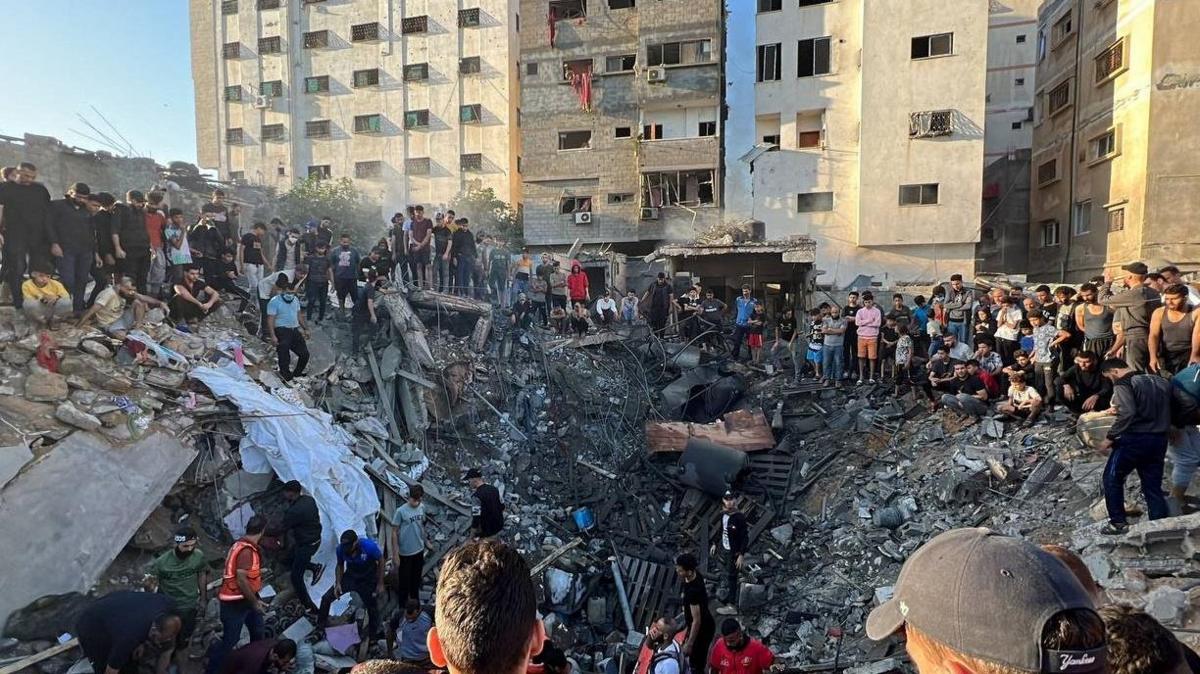
Palestinians gather at the site of an Israeli strike on a building
It's been three weeks since Hamas launched an unprecedented attack on Israel, killing 1,400 people. Israel has retaliated with intense bombing on the Gaza Strip, which the Hamas-run health ministry says has killed more than 5,000 people.
Western leaders have been visiting Israel to show their support for the country - and to ask Israeli leaders to adhere to international law and protect civilians in Gaza. A ground invasion of Gaza is expected, though there is no clear indication of when that might happen.
The situation on the ground remains fast-moving and complex. Our correspondents, many currently in the region, have attempted to bring some clarity to the picture by answering questions submitted by BBC readers - you can read their answers below.

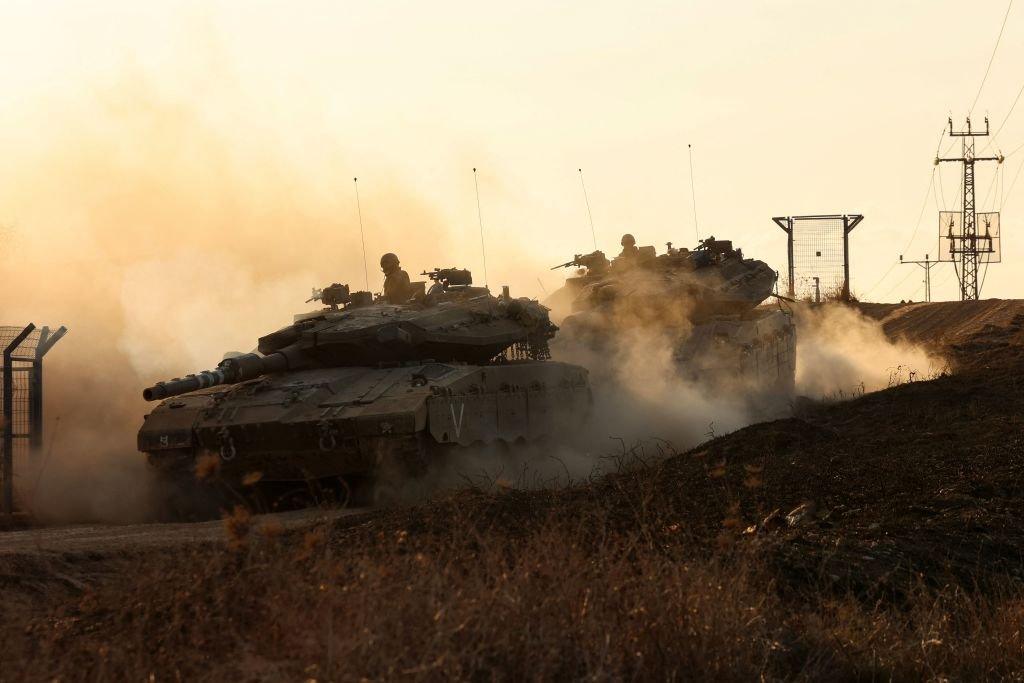
Israeli tanks moving in an undisclosed location near the Gaza Strip
How likely is a larger war?
Richard Jones asks: What is the likelihood of a larger war in the Middle East and would that be of great concern to the Israelis?
Paul Adams, our diplomatic correspondent, reporting from Jerusalem, says:
It's clearly in the minds of everyone, and why a host of foreign leaders and diplomats have made their way to Israel over the past couple of weeks.
The main focus of concern is along Israel's northern border, where exchanges of gunfire between Israeli forces and the powerful Lebanese Shia militia, Hezbollah, have escalated day by day.
Israel has deployed troops and armour to the border and taken the precaution of evacuating tens of thousands of civilians from vulnerable communities.
Hezbollah is backed by Iran, which has warned that it might have to intervene if the situation in Gaza continues to deteriorate.
For Israel, Hezbollah's stock of sophisticated missiles represents a much greater potential threat than Hamas.
The US has sent additional weaponry to Israel and deployed a carrier task force to the eastern Mediterranean as a powerful signal to Hezbollah and Iran.
But while the violence of recent days is alarming, it doesn't yet seem as though Hezbollah has taken a definitive decision to join the fight.

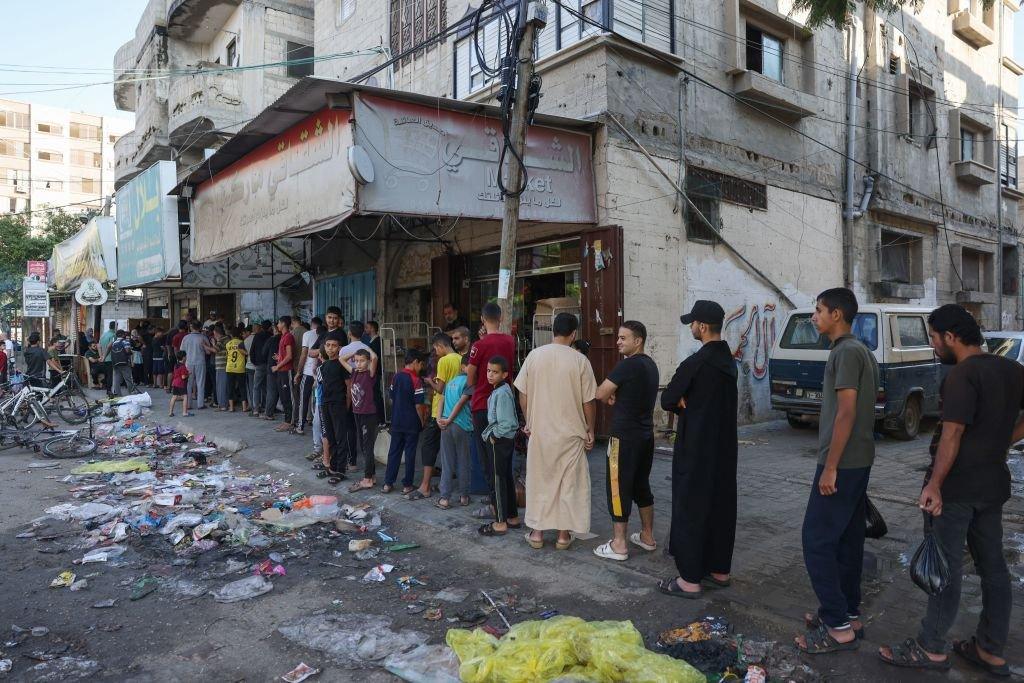
Palestinians queue to buy bread from a bakery in Rafah in Gaza
Is any food and fuel getting into Gaza?
Caroline Kelly asks: Regarding Israel's blockade of Gaza over the last two weeks - does this mean that there is literally no water, fuel and electricity available to the people of Gaza?
Middle East correspondent Tom Bateman, in Jerusalem, answers:
Israel said it was imposing a "complete siege" on Gaza. The energy minister Energy Minister Israel Katz said after Hamas's attacks there would be no supply of power or water until the hostages were released - calling this "humanitarian for humanitarian".
Since 2006, Israel had already imposed a tight blockade, backed by Egypt, on Gaza after Hamas consolidated its grip on the territory. Israel said this was to stop weapons-making supplies getting in.
But it meant life for ordinary citizens was made much tougher as Israel and Egypt controlled everything that went in and out; except for what reached Gaza via smuggling tunnels from Egypt.
Now there's no access at all except for those few aid lorries getting over the border from Egypt since Saturday and Israel allowing piped water for a few hours a day in eastern Khan Younis.
It means the only remaining sources of power and drinkable water inside Gaza are stocks from before this conflict - including private stores of diesel for generators (which can also power water filter systems in people's homes), remaining stocks of bottled water and private wells - this water is often polluted and needs to be filtered.

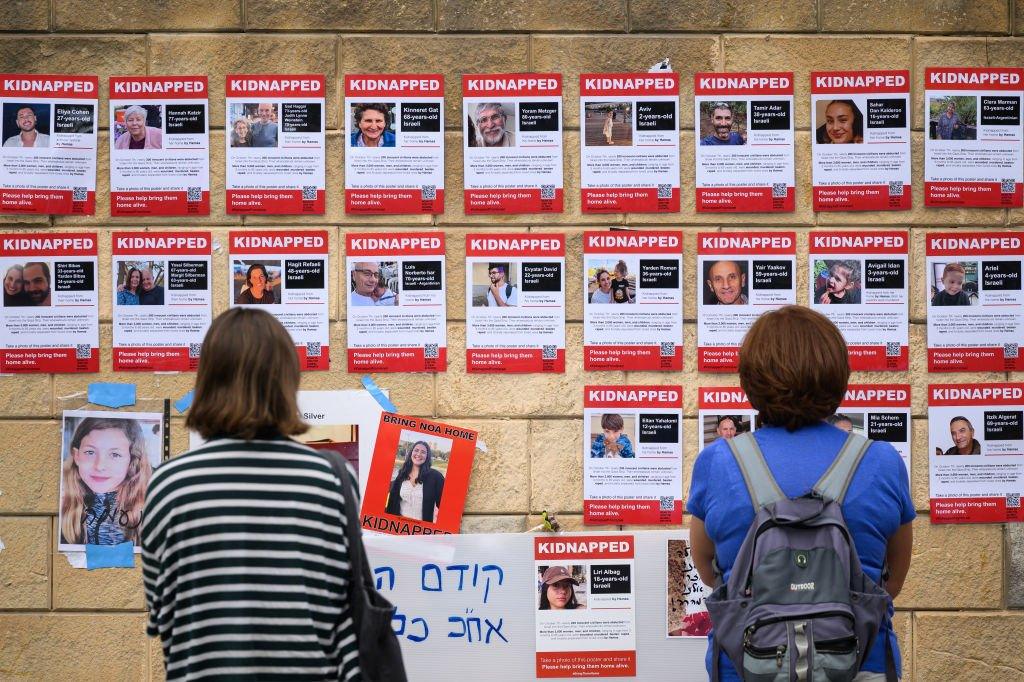
Photographs of some of those taken hostage by Hamas during their recent attacks
Will Israel be able to rescue the hostages?
From an anonymous emailer: How likely is it that Israel will be able to rescue the hostages taken by Hamas?
Security Correspondent Frank Gardner says:
Because of the very high number of hostages held in Gaza - more than 200 - the odds on Israel being able to rescue all of them by force are not good.
As we know, two hostages were released last Friday after mediation by Qatar - and another two were released on Monday. The Qataris believe more could follow but some people are suggesting this could be a delaying tactic by Hamas to deter Israel from making its expected military incursion into Gaza.
The Israelis have a lot of expertise in hostage rescue and their Special Forces unit, Sayaret Matkal, has trained intensively for just such an operation.
But they face a tough challenge. Some or all of the hostages are likely to be held underground in tunnels and bunkers, in some cases being moved around from one secret location to another.
If their captors thought their hostages were on the verge of being rescued they would quite possibly try to kill them first. So, any rescue operation will be immensely risky.

More on Israel-Gaza war
Follow live: Latest updates
Explained: What is happening in Israel and Gaza, and why now?
History behind the story: The Israel-Palestinian conflict

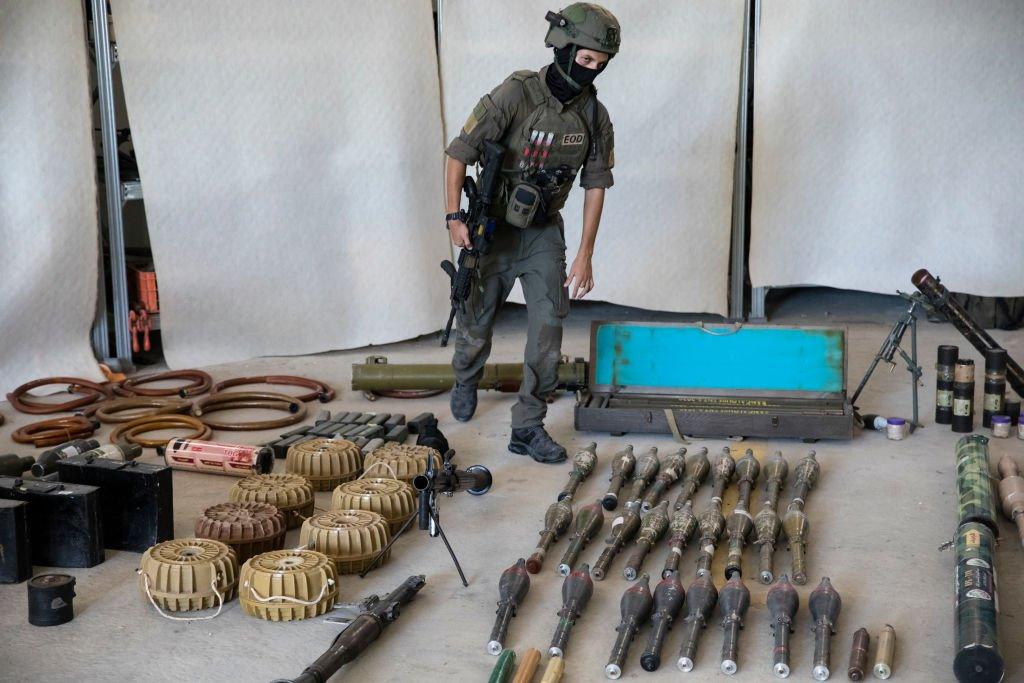
An Israeli soldier displays military equipment and ammunition that Hamas and Palestinans militants used in their attack on Israel
Where does Hamas get its money from?
Rosemary Maltus-Smith asks: Who started funding for Hamas historically? Who funds Hamas today? How do they fund Hamas?
Yolande Knell, Middle East correspondent in Jerusalem, says:
In its early days, Hamas was funded by some Palestinian expats and private donors, particularly in the Arab Gulf. Some Islamic charities also sent money.
Those sources of funding became much more difficult after it was widely designated as a terrorist entity by the US, European Union and others.
Importantly, Hamas now receives material and financial support from Iran.
In recent years, with a dire economic situation in Gaza, Qatar - which has given aid to the Palestinian territory - has been allowed to help it pay the wages of its thousands of government workers.
The US Treasury also says that Hamas has a secret international investment portfolio, which generates large sums though its assets, estimated to be worth hundreds of millions of dollars, with companies operating in Sudan, Algeria, Turkey, the United Arab Emirates and other countries.

Will the West call for a ceasefire?
Mary Freeman asks: How many innocent lives need to be lost before the West calls for a ceasefire?
Paul Adams says:
The death toll so far is staggering. More than 1,400 Israelis killed and more than 5,000 Palestinians, Gaza's Hamas-run health ministry says. That's an appalling loss of life, even by the terrible standards of the decades-long conflict between Israel and the Palestinians.
From my experience of previous rounds of violence, the West allows Israel time to punish Hamas before it starts calling for restraint, let alone a ceasefire. Western governments are generally sympathetic to Israel's desire to punish Hamas.
But this latest war is different. Israel isn't setting out merely to punish Hamas ("mowing the grass" as it has sometimes been dubbed in the past). This time, Israel is determined to eradicate the movement once and for all - politically and militarily.
That's going to involve a great deal more human suffering, and judging by the West's support for Israel so far - notwithstanding Joe Biden's warning to Israel not to act out of blind rage - it seems that Israel will be able to pursue its objectives for some time before its allies say enough is enough.

Will Fatah run Gaza again?
Alex in Cyprus wants to know whether there has been any indication from Fatah that they are willing to take over Gaza, which they lost to Hamas.
Yolande Knell answers:
So, some background first: Fatah is the secular political faction which is the main rival to Hamas.
The Fatah leader is President Mahmoud Abbas who heads the Palestinian Authority (PA) which governs parts of the occupied West Bank.
He is also the chair of the Palestine Liberation Organisation (PLO) - which is the umbrella group that is internationally recognised as representing the Palestinian people.
Hamas and Islamic Jihad are not part of the PLO, which has been the negotiator in past rounds of direct peace talks with Israel.
The PA governed Gaza but Hamas took full control there in 2007, ousting PA security forces in bloody street battles. This was a year after Hamas won parliamentary elections.
We saw the US Secretary of State Antony Blinken meeting President Abbas when he rushed to the region after the war started in Gaza.
Last week, I met Sabri Saidam, a former PA minister, who is a senior Fatah official and close to Abbas. I asked him whether the PA was being urged to return to Gaza after this war.
He told me: "Israel wants to discuss the future, America wants to discuss the future. The Palestinian leadership is quite clear - it feels strongly about it. It will not come to control Gaza and the people of Gaza on the back of an Israeli tank."

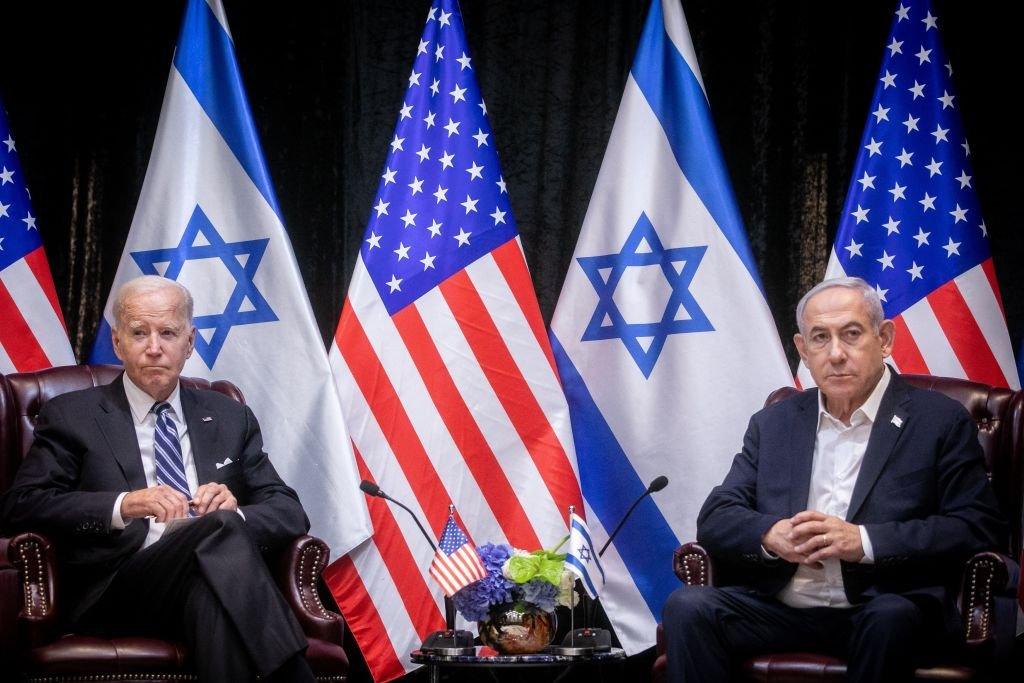
US President Joe Biden sits with Israeli Prime Minister Benjamin Netanyahu at the start of the Israeli war cabinet meeting, in Tel Aviv on 18 October
Red line for Israel?
Do Western governments have a red line for Israel in this conflict, asks Sam.
Frank Gardner replies:
If they do then we have heard very little about it. There is also no one single unified "Western position" on this conflict in the way that there has been within Nato over the full-scale Russian invasion of Ukraine last year.
The sheer savagery and cruelty of Hamas's attack on civilians in southern Israel on 7 October meant that many Western leaders rushed to offer Israel their full support.
However, as Israel's retaliatory air strikes have subsequently pummelled Gaza, causing appallingly high civilian casualties, there are growing misgivings amongst Israel's friends that the Netanyahu government is going too far.
"Don't be blinded by anger in the way we were in the US after 9/11" is the message President Biden gave Israel during his brief visit there last week.
All Western leaders have called on Israel not to breach international humanitarian law, yet that is exactly what UN agencies are now accusing Israel of doing as it bombs crowded areas and forces more than a million people out of their homes.